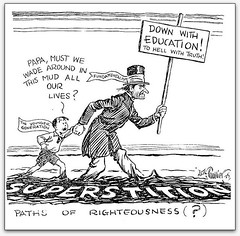Over the past 48 hours or so, I went through one of my periodic cleaning-out-my-inbox frenzies, and this time I decided that I had to do something about all the junk that was accumulating in order that this process not be quite so overwhelming in the future. A little background on my email habits. I don't like email much. I hate using it for personal communications. I'd much rather talk on the phone. I'm also a natural-born procrastinator and ADDer. At the same time, I have a gluttonous appetite for information, in a way that I think is probably not all that good for my mental hygiene. What this adds up to is that I tend to sign up for every newsletter, alert, and update list that sounds like it might be interesting, and then let the emails pile up and bury the stuff that I really need to see. Once a month or so I go on a tear and erase everything. I hate doing this because I always discover emails that required me to take some action, like, two weeks prior.
This time, though, I created a new folder in Outlook (yes, I use Outlook) called "Unsubscribe" and put one copy of every ad, newsletter, and alert into it. Since then -- this was maybe Thursday -- I have been systematically going through that folder, finding the unsubscribe instructions in each message, and trying to get myself off the list. This turned out to be kind of an interesting experience and I thought I'd share some of my observations.
First, to my happy surprise, most of them make it pretty easy to unsubscribe these days. Most of the commercial emails now include something like a "safe unsubscribe" link, a URL with a long hashed argument, that will take you off the list with a single click. That makes the process pretty painless. Others, however, make you sign in and "manage your email preferences." That's annoying, especially since I usually couldn't remember the password, so I had to go through the process of requesting a reminder and resetting it and so forth. The toughest ones to deal with were, I think, Borders.com and Washingtonpost.com. (In the case of the latter, I'm still not actually sure I've unsubscribed.) But all in all, I'd guess that 75% of the messages could be dealt with very quickly.
The most irritating, unexpected problem to arise (and it's my own fault): over the years, I've signed up for things with four or five different addresses, and it's not always obvious from the email which address they're being sent to. I had to remember to check the headers to make sure I was unsubscribing the right address. This was especially problematic with old-fashioned listservs, since you control your subscription to those via email addresses and it takes a few minutes before the server lets you know whether your command was successful. I'd send a message like SIGNOFF POD to the list management address, then three minutes later I'd get two messages, one telling me my command had failed, the other one telling me that my address was not subscribed. You get the picture.
The lesson there is that I suppose you really need a simple "email policy" if you have multiple addresses. One address for all nonpersonal updates. I used to use different addresses based on how concerned I was about privacy -- i.e., one of several addresses that didn't suggest my name for mailing lists that I feared might sell my information, a freebie mail-forwarding service for lists that I thought might spam me. I used my work email for professional mailing lists and my Gmail account for stuff that had no professional connection. Etc. Well, not any more. I created a new address for all bacn. From now on, when I subscribe to anything (and I'll try to do it as little as possible), I'll use that. Everything sent to that address is going to get filtered so I don't see it unless I go looking for it. Probably the important principle to derive from this is: assume that every time you give your email address to a corporate entity, you'll start getting email from them in some quantity, and since you probably don't want to continue receiving those emails until you die, you'll probably want to unsubscribe someday. So think of a strategy (I'm not sure what the best strategy should be) now for making that unsubscribing process as painless as possible, or, failing that, at least avoid ways of making it more painful than it needs to be (like I have by using a welter of different addresses).
What was more interesting was that the process was really an object lesson in the "attention economy" concept. Going to one website after another to remove myself from their mailing lists brought home to me in a very concrete way how many corporations there are out there to whom I've voluntarily given some amount of personal information about my interests (as well as my demographic data). I unsubscribed from somewhere between 200 and 250 lists over the past couple days, and I think at least half were simple commercial messages.
Even odder, though, was the fact that I found it difficult, even painful. Like I said above, I'm something of a glutton when it comes to information. I behave with email updates more or less the same as I do at a cheap buffet restaurant -- I want to make sure I take one of everything, lest I inadvertently miss out on something good. I've never bought anything as a result of one of those marketing plugs from Circuit City or Babystyle or whatever, but I kind of had to steel myself to make the decision that I wouldn't even have the chance to know anymore when they were having their sales (not that I had even been reading the emails previously). This was even more true with information that I really like having at my disposal, even though I hadn't been taking advantage of it -- updates from Orion Magazine, headlines from the Washington Post, and the newsletter from the Simple Living Network (all excellent publications, in my view, but ... they were just sitting in my inbox for a month and then getting deleted). I kept having to repress this irrational fear of not knowing about something. (Luckily most of these publish feeds now, so I could placate those anxieties relatively easily.) My intuition tells me that the economics of the web plays on this fear pretty heavily. I also tend not to think that checking the box that says "notify me of promotions" for some business that I actually patronize might cost more, in terms of wasted time and energy, than it's worth.
I was also amazed to discover just how long I've been putting up with some of this stuff. Until last night, I was getting promotions at least monthly from DataViz because I am a registered user of MacLink Plus. I used that program with my old gray Powerbook, which I bought for grad school in 1995. I probably used it with my tangerine iBook, which I bought in 1999. I retired that computer four years ago and haven't used an Apple product with any regularity since then. (Nothing against Apple; I'm just broke.) I have also been getting promotions from Williams Sonoma, where I am sure I will never buy anything -- I stopped into their mall store once a few years ago and bought, for six bucks, a bunch of dishtowels that were on clearance, and when checking out I supplied my email address, and voilà.
The other thing that struck me was the vast range of uses to which we've put email, particularly authenticating identity. Almost every time I had to log in to a site to get myself off their list, it was a site where I'd created and then forgotten a password. Why bother remembering passwords when you can always just have it emailed to you? So instead of authenticating my identity via some unique piece of information in my head (password), I'm authenticating my identity as the human who uniquely has access to a particular email address. In a sense, then, my secure access to my various email addresses becomes the master authentication framework for all my other web-based identities. I guess it works O.K., but it doesn't seem like the smartest way to use email. Presumably other people have commented on this phenomenon too.
Another thing I had started using Gmail for was archiving my own content. I use a number of services that generate feeds, and I was using RSSFwd to create an automatically-updated, searchable archive of blog posts, CiteULike entries, and even del.icio.us links. Here again I decided that this was more trouble than it was worth. I have never actually used those archives for anything and they just cost time and energy to process. Sure, I could have set up filters, and maybe I still will, but I want to see if I actually want to after a few weeks.
Beyond this, there's the email-as-broadcasting model. I had created various of my own custom newsletters and newsradars using SimplyHeadlines (a great service if you don't know about it), squeet (now apparently offline), RSSFwd, R-mail, Google Alerts, and FeedBlitz. I had also signed up to get daily headlines from the Washington Post. Then there were all the listservs for things I was curious about: Christian Peacemaker teams (via mennolink.org), the National Security Archive, FICINO, the Relocalize network, A.Word.A.Day, and the Simple Living Network. Then there were the Google and Yahoo groups, the successors (in a way) to Usenet: groups for TiddlyWiki users, for patrons of the Phoenixville Farmers Market, and for Freecycle of Chester County, PA. I had also signed myself up for Google's news and web alerts for various topics, plus I was monitoring half a dozen web pages for changes using WatchThatPage (an astoundingly full-featured, reliable free service. I cannot recommend it highly enough. Go check it out).
Some of this stuff I just junked. I didn't have the time to read it anyway. Everything with a feed I put in my feed reader under the tag "feeds on probation," to see if I would ever actually look at it again. I didn't figure out what to do about sites that offer email newsletters but no RSS feeds. Is there an agreed-upon best model for handling those? I've tried various mail-to-rss solutions, like Mail2RSS.org and Mailbucket, but both do peculiar things to HTML-formatted messages, and plus it seems like a hack. For the moment, I'm going to subscribe to them in my new bacn-only address, but that seems like even more of a hack.
For the moment, I continue to subscribe to a number of fairly high-volume email lists from H-Net and other professional groups. I filter them into their own mailboxes and, to be honest, hardly ever read them. But for the most part, I expect to get a tiny fraction of the email that I used to get. I hope. Now, I suppose, we'll see if all these unsubscribe requests actually "took." As I was writing this entry, I got an ad from Circuit City, which I thought I'd unsubscribed from. I guess I'll try again. I also got a message from one of my mailing lists in my inbox, when I thought I'd set up a filter to divert all that stuff to my bacn box. I guess I'm not done yet. But I hope soon to have an inbox blissfully free of "earn more miles" schemes, Amazon.com new product announcements, weekend car rental deals, "free" VistaPrint offers, BlogCatalog notices, "free shipping when you spend ten thousand dollars" at this or that online retailer, etc. Wish me luck.
"maybe it's 'cuz 'cuz
we're all gonna die die"
Sunday, September 30, 2007
Bacn, go away
Posted by
Nathan Rein
at
06:11
0
comments
![]()
Labels: report
Saturday, September 15, 2007
Neo-ugly photography revisited
My obsession with taking photos with my cameraphone over the dashboard of my car while driving (at risk to my life) has waned somewhat, but every once in a while I still get one that turns out interesting with a little post-processing.

Posted by
Nathan Rein
at
06:16
0
comments
![]()
Labels: photos
Sunday, September 09, 2007
"The East Wind Sighs," Li Shang-Yin, 9th c. CE
The East wind sighs, the fine rains come:
Beyond the pool of water-lilies, the noise of faint thunder.
A gold toad gnaws the lock. Open it. Burn the incense.
A tiger of jade pulls the rope. Draw from the well and escape.
Chia's daughter peeped through the screen when Han the clerk was young.
The goddess of the river left her pillow for the great Prince of Wei.
Never let your heart open with the spring flowers:
One inch of love is an inch of ashes.
Posted by
Nathan Rein
at
08:05
0
comments
![]()
Labels: findings
Friday, September 07, 2007
Cartoons on evolution, ca. 1930
Postscript on Twitter file-sharing hack
I got this email from Box.net support today:
Hello,This means that the trick I described in the previous post for using a Box.net tag to share your files on Twitter (using tag-based sharing and Twitterfeed) is officially unsupported by Box. Give it a shot, but be aware that it may quit working at any moment. You can still use folders for the same purpose, though -- it's easy to make a folder public, and public folders have RSS feeds. But using tags is oh so much more 2.0, you know?
Thank you for your message.
Tags are used to sort the files in your account; this helps you to search files pretty quickly from your account. We do not support sharing files using tags so although it might have worked, it may no longer. We will let you know if we support this feature in the near future.
Please feel free to get back to us for any further assistance.
Sincerely,
The Box.net team
Posted by
Nathan Rein
at
15:18
0
comments
![]()
Wednesday, September 05, 2007
Two fun Twitter hacks: voice-to-text tweets and file-sharing
I love Twitter. Dave Winer wrote that "Twitter is a coral reef, and Pownce is just a shipwreck." For aspiring non-tech-inclined geeks like me, Twitter offers endless possibilities for just messing around with stuff for no reason at all. Here are my latest two ideas. Maybe someone will actually read this (unlikely, but who knows) and find them useful (probably even unlikelier).
First, the voice-to-text tweeting. There's one way to do this that works, another way that doesn't, and neither is perfect. First, the easy way, the one that works. Open an account on Jott, then check out the new (?) "Jott links" feature. (I just discovered this today, and their blog seems to suggest that it is, indeed, quite new.) Give Jott your Twitter credentials. Then you can phone Jott, say "Twitter" when asked you you want to send your Jott message to, and speak your tweet. ("Speak your tweet" -- has a kind of a ring to it, doesn't it?) Jott will transcribe your message and post it to Twitter within a few minutes at most. I find their transcription is, well, not perfect, but pretty impressive, especially given that the times I'm most likely to use such a service I'm usually talking on a cell phone in a noisy environment (plus I have a very low-voiced, muttering way of talking). Anyhow, you'll get a tweet that looks like this:
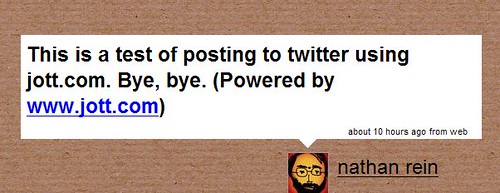
The problem with this is that if your transcribed text goes over the 140-character limit, it seems to be just gone, and in fact i think the limit is lower because Jott adds "powered by http://jott.com" to the end of each tweet. For this reason it occurred to me you might do the following. Go to Twittermail and enter your Twitter login credentials. You'll get back a long, convoluted-looking email address. Any text you send to this address will be Twittered. The nice feature of Twittermail is that if you send more than 140 characters, they'll archive it for you and insert a link into your tweet, with a result that looks like this:
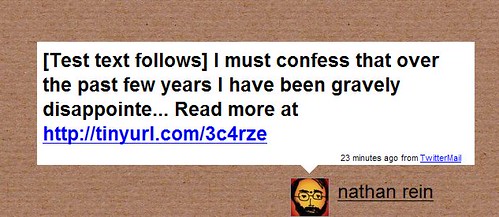
If you click on the tinyurl link, you'll see this:
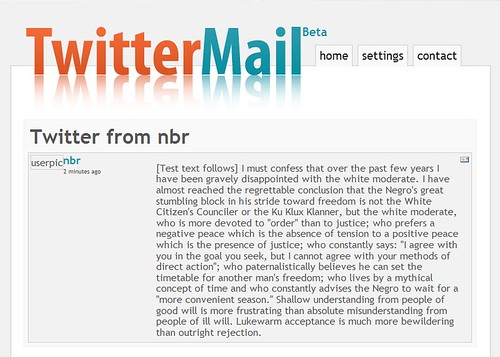
So, take that Twittermail email address and add it to your Jott contacts. Then, instead of Jotting to "Twitter," you can Jott to "Twittermail," and it'll send your whole email to that address, and whatever goes over the 140-character limit will get archived.
Well, it doesn't work, because the email that gets sent ends up looking like this:
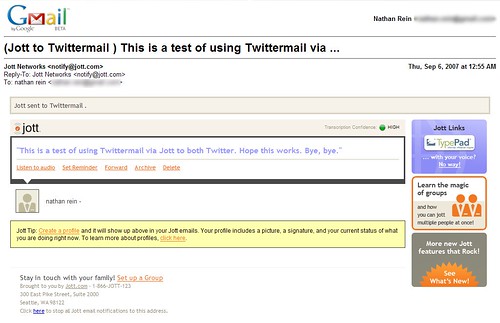
Not exactly a text-only email, you see. Apparently this simply overwhelms Twittermail. When I tried it, nothing ever got posted to Twitter.
So, if Jott would provide an option to send mail to certain contacts as text-only, wouldn't that be great? Jott, are you listening?
The other thing I came up with is to use Twitter as a file-sharing platform. Here's a sample tweet:
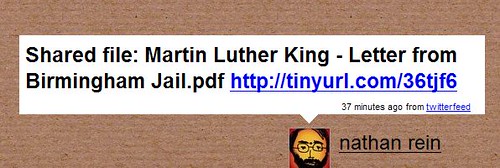
This is pretty simple but requires several steps. First, open a Box.net account. They have decent free ones available. Upload the file you want to share. Tag it "post:twitter" or whatever. Then, you need to enable public sharing (i.e., publishing) for that tag. The only way I could figure out to do this -- it's a pain -- is by going into my display preferences, and asking to be shown the "old" file view (or by logging in and going to the URL www.box.net/browse#mybox). This view displays a column of tags down the left-hand side of the screen. You can then click on the pulldown menu next to the tag you want to publish and select "Share." It'll give you a page URL and as feed URL. Copy the feed URL. It will look like this:
http://www.box.net/shared/t_iupej4pkc1/rss.xml
Replace the word "shared" with "public." Really. Then you'll have a working feed URL. I'm guessing tag-based sharing isn't really supported by Box any more since their redesign, but this seems to work anyhow. Try it.
http://www.box.net/public/t_iupej4pkc1/rss.xml
Paste this feed into Twitterfeed and there you go. Anything you upload to Box.net and tag with post:twitter will automatically get published to your twitter stream. Eat your heart out, Pownce.
These instructions are pretty telegraphic; if you need clarification, let me know (comment or twitter or email or whatever).
Posted by
Nathan Rein
at
22:30
0
comments
![]()
Tuesday, September 04, 2007
bell hooks talks to Diane Rehm, WAMU-FM, January, 2000

I grew up in DC listening to Diane Rehm on WAMU. I forgot how great she was. (Don't get me started on Terri Gross.) And, this is the first time I've ever actually heard bell hooks speak. She was being interviewed after publication of her book, All About Love. The interview is almost an hour and can also be downloaded from hooks's website. bell hooks is astonishing. The level of vulnerability and honesty, combined with uncompromising analytical rigor -- an absolute refusal to believe that her suffering is ever just about her own individual fate, her insistance that some historical meaning can be wrung from every experience -- that's what I want to achieve for myself, and I hope that my students can see its value as well. The interview runs 51 minutes and the file is 24 MB.
Posted by
Nathan Rein
at
18:06
0
comments
![]()
Labels: audio
Monday, September 03, 2007
Interesting conversation at Bavatuesdays: education, rights, and universality
Over at Jim Groom's bavatuesdays blog, there's an interesting conversation going on about the question of whether or not education should be considered a basic human right. (D'Arcy Norman has also weighed in. This is in reference to an online course, "Introduction to Open Education," by David Wiley.) Groom's instinctive response (I'm guessing about the "instinctive" part, of course -- I suppose I'm projecting) is to slap quotation marks on "right" and "education" and to remind us that framing the question in this way reinscribes a whole cluster of modern Western assumptions about the relationship between the individual and the state which are impossible to universalize (and indeed the effort to universalize them may even be harmful, though that's a whole other conversation). Speaking as a historian, I agree wholeheartedly. The notion that you can take two highly contingent, constructed categories -- "right" and "education" -- and then ask whether one fits into the category defined by the former, in some kind of ahistorical, absolute sense -- well, it just raises all my Foucauldian hackles.
But it seems to me that there's another, perhaps "softer" way of reading the question, too. It sort of depends on whether you think of bell hooks or Sister Mary Elephant when you think of education. It's also possible to think of a "right to education" from a more subjective perspective, as more or less equivalent to, say, "a right of equal access to the socially-stewarded means by which one achieves majority, dignity, and the status of a full participant in one's community." Paolo Friere might argue that conventional, formal, institutionalized education, which in many modern settings is actually the means by which a human person is transformed into a subject of the state, actually works against this goal, which is fundamentally emancipatory, transformative, and even revolutionary. Ivan Illich, in Deschooling Society (1973) wrote:
Many students, especially those who are poor, intuitively know what the schools do for them. They school them to confuse process and substance. Once these become blurred, a new logic is assumed: the more treatment there is, the better are the results; or, escalation leads to success. The pupil is thereby "schooled" to confuse teaching with learning, grade advancement with education, a diploma with competence, and fluency with the ability to say something new. His imagination is "schooled" to accept service in place of value.That other great educational theorist of our time, Pink Floyd, would probably agree. In this sense, you might even argue that people ought to have a right not to be educated if they don't want to be. As Peter Elbow remarked, teaching should only be performed with consenting adults. After all, you can't "mandate" transformation, dignity, or full personhood. You can try to make the means to those ends as widely distributed and as easily available as possible, but that's ultimately a subversive activity. Not to mention that experience suggests it is also easily co-opted. But that doesn't mean it's not important.
Posted by
Nathan Rein
at
19:31
2
comments
![]()
Saturday, September 01, 2007
How to write a blog post, for my students
I just posted a short piece on my teaching blog on how to write a blog post, for my incoming students (especially those in my first-year liberal studies seminar) this semester. It's not really a how-to; it's just some general principles about what a blog entry should be (i.e., open-ended, honest, questioning, and invested in its subject). Anyhow, if you're interested, it's there...
Posted by
Nathan Rein
at
22:13
0
comments
![]()
Why I don't bother with MySpace any more
What I saw in my MySpace inbox today: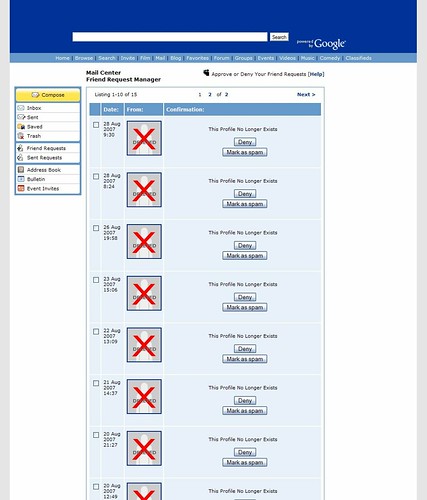
But of course I'm enough of a sucker that you can still friend me if you want. You'll have more luck finding me via Facebook or Twitter.
Posted by
Nathan Rein
at
15:49
0
comments
![]()
Labels: web
